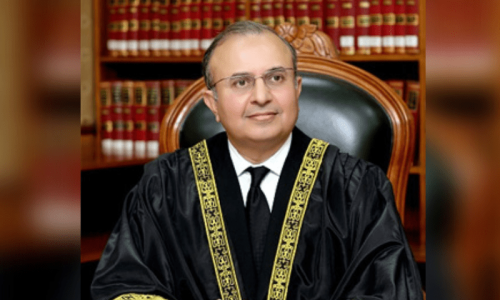KARACHI, June 29: Nearly 100 per cent increase has been witnessed in the number of killings across the city during the first five months of the year as compared to last year’s corresponding period, it emerged on Saturday.
While 750 people had been killed between January and May last year, as many as 1,450 people were killed in the city over the past five months, according to the Human Rights Commission of Pakistan.
The HRCP says the month-wise breakdown of killings as reported in the press shows that March remained the bloodiest of all the five months when 324 people were killed, followed by 302 in January, 286 in May, 275 in February, and 266 in April.
The victims included 67 women and 63 children.
“There are a variety of factors contributing to the situation. There are banned militant outfits such as Lashkar-i-Jhangvi and Sipah-i-Sahaba Pakistan collaborating with each other, the Lyari gang warfare, and then the election-related violence that did play a role in increasing the number of killings this year round. In fact the Taliban made their presence felt before the general elections by targeting certain political parties in bomb attacks, while they also asserted themselves even after the elections,” said HRCP chairperson Zohra Yusuf while citing that the Taliban claimed the responsibility of the recent killing of MQM MPA Sajid Qureshi.
About the role of law-enforcement agencies and of the apex court that took suo motu notice of the killings, she said that the suo motu notice had been taken after the midsummer ethnic killings in 2011. “But merely summoning the Rangers or police time and again can’t improve the situation,” she observed. It was the cooperation between the Awami National Party and the Muttahida Qaumi Movement and the spirit of reconciliation that ethnic riots were prevented and ethnic killings dropped, she said. But targeted killings, particularly those on sectarian grounds, continued till date, she said while recalling the deadly Abbas Town bombing that was claimed by the Taliban though members of both Sunni and Shia communities became victims in the incident.
She said major political parties would have to follow a common agenda and decide to root out militancy from society. If all the parties having representation in the assembly did not reach a consensus that they must purge the society of militants, she feared the situation was not going to improve in the city.
She said the MQM had their reservations over the targeted operation of Rangers. The party had raised their voice for ‘missing person’ cases. If the major political parties, including the new entrant Pakistan Tehreek-i-Insaf, had a common agenda to fight militancy and curb violence in Karachi, they could assert themselves and collaborate with the law-enforcers to get the job done. This would also put a check on abuse of powers and issues of rights violation, she said, while referring to the MQM complaint.
When Sindh Information Minister Sharjeel Inam Memon was questioned if the government would invite all major parties to set a common agenda to fight militancy, he said that if all political and religious parties eliminated their militant wings and purge them from such elements, the situation would improve in Karachi considerably.
Asked what hurdles the government was facing in implementing its writ, the minister said that a large number of cases remained pending before courts for years. He said police risking their lives arrested criminals but their cases were not tried on a day-to-day basis. He added that peace could be restored if all criminal cases were tried on a daily basis. He said the PPP government apprehended the killers of MPA Raza Haider and also journalist Wali Babar but the killers of Murad Baloch and Munawar Suhrawardi were never arrested. He said those under custody at present if found innocent would be released but among them there were those who were involved in as many as 100 killings and confessed to the joint interrogation team that they were trained in India. Such people should be treated as criminals. He said many years had passed since the tragedy of May 12 but only three hearings had been held so far. He asked why judges did not try the case on a daily basis. “Are they afraid?” he asked.
In reply to the question that whether the government was planning to give the home affairs portfolio to someone, the minister said that considering the situation of Sindh the chief minister was suitable for this portfolio.
MQM deputy parliamentary leader Khwaja Izharul Hasan said that there was no use of calling an all-party conference to set a common agenda to fight militancy if the government was not serious. He said criminals in Karachi had the backing of political parties and law-enforcement agencies and until that support was not withdrawn the situation would not improve.
Explaining what Leader of the Opposition in the Sindh Assembly Faisal Sabzwari had said about deweaponisation, he said there were three phases of that. Firstly, he said, the arms supply from other parts of the country to Karachi should be checked. Secondly, there could be an indiscriminate crackdown against illegal weapons and thirdly, arms licences be verified. However, he added, this would take time.
The MQM lawmaker said the special powers given to the Rangers and the suo motu notice the apex court had taken on the law and order situation in Karachi did not prove effective in that the number of killings continued to surge.












































Dear visitor, the comments section is undergoing an overhaul and will return soon.